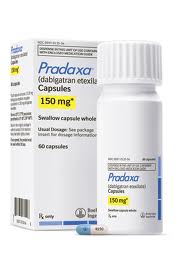September 6, 2012 — Researchers have found that Pradaxa (dabigatran) is increasingly being used “off-label,” for uses not approved by the U.S. Food and Drug Administration (FDA).
In 2010, the FDA approved Pradaxa to treat atrial fibrillation, a type of irregular heart rhythm that can cause blood clots to form, which may then be pumped into the brain. The researchers found that Pradaxa is increasingly being prescribed to people suffering from Venous Thromboembolism (VTE), hypertensive heart disease, and coronary artery disease.
The study was conducted by Dr. Caleb Alexander of Johns Hopkins Bloomberg School of Medicine in Baltimore, and it was recently published in the journal Circulation. Dr. Alexander and colleagues wanted to investigate the impact of Pradaxa on clinical practice and prescriptions. When Pradaxa was new, 92% of prescriptions were for people with atrial fibrillation. By the end of 2011, that number dropped to 63% — reflecting the increasing proportion of people being prescribed Pradaxa for “off-label” treatments.
Doctors are allowed to prescribe medications for uses that are not approved by the FDA. However, this practice is not without risks. Pradaxa has been linked to hundreds of deaths, mostly due to severe bleeding — a common side effect of blood-thinning medications. Unfortunately, the anticoagulant effects of Pradaxa cannot be easily reversed during a bleeding emergency, when blood clots are necessary to stop bleeding. Only 2-3 hours of dialysis can remove Pradaxa from the bloodstream. Coumadin (warfarin), which continues to be the most popular blood-thinner in the United States, can be reversed with a dose of Vitamin K.
The researchers found that there was no change in the rate of prescriptions for blood-thinners — this remained constant at 35% before and after Pradaxa was approved by the FDA. They also found that approximately one-fourth of people who are prescribed a blood-thinner are given Pradaxa.
The researchers drew their conclusions from an analysis of public records in the IMS Health National Disease and Therapeutic Index. They also collected data regarding the costs of the medications. They found that the expenditures for warfarin have decreased — from $169 million per quarter in 2007 to $144 million by the end of 2011. Expenditures for Pradaxa have increased dramatically — from $16 million soon after Pradaxa was approved in 2010, to $166 million at the end of 2011.
As the use of Pradaxa increases, so do the number of Pradaxa lawsuits filed by people who were seriously injured, or families of people who died. In August 2012, a federal judge created a federal Multidistrict Litigation (MDL) to handle the lawsuits, which currently involves 72 lawsuits. Most of these lawsuits allege that Boehringer Ingelheim, the company that manufactures Pradaxa, failed to adequately warn about the risks of bleeding — and specifically, Pradaxa’s lack of a reversal agent during a bleeding emergency.
Need a Pradaxa Lawyer in Texas?
Collen A. Clark is a true advocate for his clients and is passionate about helping Texans that have been injured or wronged.
Collen’s amazing success in the courtroom and well known dedication to his clients has earned him the recognition of his peers as one of The Top Trial Lawyers in Texas.”
The Clark Firm has assembled a team of trial lawyers with more than 100 years experience, participation in over 600 jury trials and $260 million in verdicts and/or settlements. Please use the form below to contact our Texas Pradaxa lawyers for a free lawsuit review.



 To contact us for a free review of your potential case, please fill out the form below or call us toll free 24 hrs/day by dialing:
To contact us for a free review of your potential case, please fill out the form below or call us toll free 24 hrs/day by dialing: